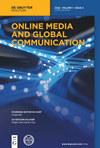管理未来城市:变革背景下的媒体、信息和通信技术
引用次数: 0
摘要
摘要目的本文的目的是考察信息技术和媒体在两个欧洲案例研究中的使用情况——柏林和华沙。研究结果可用于根据两个欧洲城市的不同战略制定城市政策和媒体基础设施设计。柏林和华沙在实施智能城市概念方面走了不同的道路,使这一理念适应其经济、历史和社会现实。媒体在这里被理解为人机和机器-机器通信,也被理解为物理和数字媒体基础设施。方法该研究旨在根据市政厅当局智能解决方案的实际实施情况,审查战略和机构(私营和公共)。该研究将灰色文献(新闻报道、企业战略、市政厅文件)的分析与定性研究相结合:对两个城市的地方市政当局和城市规划者进行了30次半结构化访谈。调查结果调查结果可能为实施智能城市解决方案的潜在驱动因素和障碍提供证据。研究结果表明,由于通常独立实施智慧城市战略的实体的数据政策,城市中的媒体和信息技术得以实施。城市当局的任务是保证获得基本基础设施,这是私营实体创建其他解决方案的基础。实际意义实证研究可能提供证据表明,柏林和华沙尚未充分认识到基于机器之间通信的解决方案,但“临时”解决方案的使用越来越多。社会影响本研究可作为智能城市管理者、媒体基础设施和城市战略的信息来源,重点关注居民以及信息和通信技术。调查结果面向媒体和城市专家和学者,以及社会学家、政治学家、工程师、信息和通信技术专家、决策者、城市管理者和公民。价值研究表明,移动设备、媒体等服务和信息通信技术的重要性日益增长,导致市政厅的发展战略和分析城市的新理论方法发生了变化。这项研究发现,网络、平台和媒体基础设施已被用来描述城市当局、公民和机器之间的新沟通方式。有人认为,培养先进的媒体基础设施(软硬件)有可能创建“未来之城”。本文章由计算机程序翻译,如有差异,请以英文原文为准。
Managing future cities: media and information and communication technologies in the context of change
Abstract Purpose The goal of this paper is to examine the usage of information technologies and media in two European case studies – Berlin and Warsaw. Findings from the research can be used to create urban policies and media infrastructure design, based on the different strategies of two European cities. Berlin and Warsaw have taken different paths in implementing the smart city concept, adapting the idea to their economic, historical, and social realities. Media are understood here as human-machine and machine-machine communications, and also in terms of both physical and digital media infrastructure. Methodology The research aims at examining strategies and institutions (both private and public) in light of the practical implementation of smart solutions by City Hall authorities. The study combines analysis of grey literature (news reports, corporate strategies, City Hall documentation) with qualitative research: 30 semi-structured interviews conducted with local municipalities and city planners in both cities. Findings Findings are likely to provide evidence potential drivers and barriers to the implementation of smart city solutions. The results provide evidence that media and information technologies in the city are implemented due to the data policies of entities that usually implement smart city strategy independently. The task of city authorities is to guarantee access to basic infrastructure, which is the basis for creating other solutions by private entities. Practical implications The empirical research is likely to provide evidence that Berlin and Warsaw have not yet fully appreciated the solutions based on communication between machines, but there is increasing use of ‘ad hoc’ solutions. Social implications This study may be used as a source of information for smart city managers, media infrastructure, and urban strategy with a focus on residents and information and communication technologies. Findings are addressed to media and urban experts and scholars, as well as sociologists, political scientists, engineers, ICT specialists, policy-makers, city managers and citizens. Value The study shows the growing importance of mobile devices, media-like services and ICT have resulted in changes in City Hall’s development strategies and new theoretical approaches through which the cities might be analysed. This study finds that networks, platforms and media infrastructure have been used to describe new ways of communication between city authorities, citizens and machines. It has been argued that fostering an advanced media infrastructure (soft and hard) has the potential to create “The Future City”.
求助全文
通过发布文献求助,成功后即可免费获取论文全文。
去求助
来源期刊

Online Media and Global Communication
Communication, Media Studies, Internet Studies, International Studies, International Relations-
自引率
0.00%
发文量
0
期刊介绍:
Online Media and Global Communication (OMGC) is a new venue for high quality articles on theories and methods about the role of online media in global communication. This journal is sponsored by the Center for Global Public Opinion Research of China and School of Journalism and Communication, Shanghai International Studies University, China. It is published solely online in English. The journal aims to serve as an academic bridge in the research of online media and global communication between the dominating English-speaking world and the non-English speaking world that has remained mostly invisible due to language barriers. Through its structured abstracts for all research articles and uniform keyword system in the United Nations’ official six languages plus Japanese and German (Arabic, Chinese, English, French, Russian, Spanish, Japanese, and German), the journal provides a highly accessible platform to users worldwide. Its unique dual track single-blind and double-blind review system facilitates manuscript reviews with different levels of author identities. OMGC publishes review essays on the state-of-the-art in online media and global communication research in different countries and regions, original research papers on topics related online media and global communication and translated articles from non-English speaking Global South. It strives to be a leading platform for scientific exchange in online media and global communication.
For events and more, consider following us on Twitter at https://twitter.com/OMGCJOURNAL.
Topics
OMGC publishes high quality, innovative and original research on global communication especially in the use of global online media platforms such as Facebook, TikTok, YouTube, Twitter, Instagram, WhatsApp, Weibo, WeChat, Wikipedia, web sites, blogs, etc. This journal will address the contemporary concerns about the effects and operations of global digital media platforms on international relations, international public opinion, fake news and propaganda dissemination, diaspora communication, consumer behavior as well as the balance of voices in the world. Comparative research across countries are particularly welcome. Empirical research is preferred over conceptual papers.
Article Formats
In addition to the standard research article format, the Journal includes the following formats:
● One translation paper selected from Non-English Journals that with high quality as “Gems from the Global South” per issue
● One review essay on current state of research in online media and global communication in a country or region
 求助内容:
求助内容: 应助结果提醒方式:
应助结果提醒方式:


